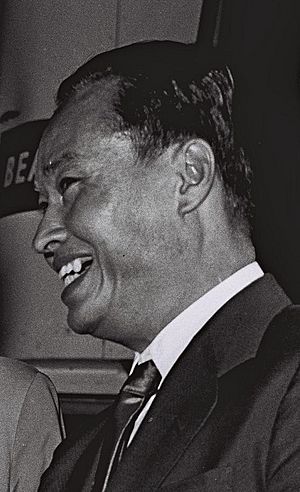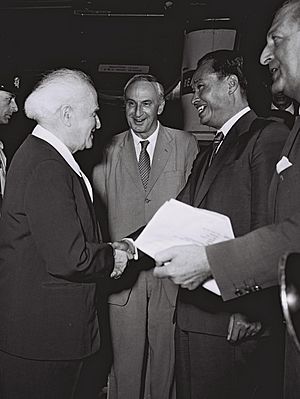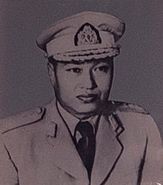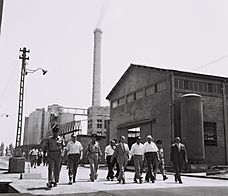Ne Win facts for kids
Quick facts for kids
Ne Win
|
|
|---|---|
| နေဝင်း | |

Ne Win in 1959
|
|
| Chairman of the Burma Socialist Programme Party | |
| In office 4 July 1962 – 23 July 1988 |
|
| Preceded by | Office established |
| Succeeded by | Sein Lwin |
| 4th President of Burma | |
| In office 2 March 1974 – 9 November 1981 |
|
| Preceded by | Win Maung (1962) |
| Succeeded by | San Yu |
| Chairman of the Union Revolutionary Council | |
| In office 2 March 1962 – 2 March 1974 |
|
| Preceded by | Office established |
| Succeeded by | Office abolished |
| Prime Minister of Burma | |
| In office 29 October 1958 – 4 April 1960 |
|
| President | Win Maung |
| Preceded by | U Nu |
| Succeeded by | U Nu |
| In office 2 March 1962 – 2 March 1974 |
|
| Preceded by | U Nu |
| Succeeded by | Sein Win |
| Personal details | |
| Born |
Shu Maung
10 July 1910 or May 1911 Paungdale, Pegu Province, Lower Burma, British India |
| Died | 5 December 2002 (aged 92) Yangon, Union of Myanmar |
| Resting place | Ashes scattered into Hlaing River |
| Nationality | Burmese |
| Political party | BSPP |
| Spouses | 5, including Yadana Nat Mei |
| Children | 6, including Sandar Win |
| Alma mater | Rangoon University |
| Occupation |
|
| Signature |  |
| Military service | |
| Allegiance | Socialist Republic of the Union of Burma |
| Branch/service | Burmese Army |
| Years of service | 1931–1974 |
| Rank | General |
Ne Win (Burmese: နေဝင်း IPA: [nè wɪ́ɰ̃]; 10 July 1910 or 14 or 24 May 1911 – 5 December 2002) was a powerful military leader and politician in Myanmar (formerly Burma). He served as the Prime Minister of Burma from 1958 to 1960 and again from 1962 to 1974. He was also the President of Burma from 1962 to 1981.
Ne Win was the de facto (actual) leader of Burma for many years. He led the country as a military dictator from 1962 to 1988. During this time, Burma was known as the Socialist Burma. He created the Burma Socialist Programme Party (BSPP) and introduced an idea called the Burmese Way to Socialism.
His time in power was known for Burma staying neutral in global politics and being very isolated from other countries. The economy also struggled a lot. Ne Win stepped down in July 1988 because of big protests known as the 8888 Uprising. He was later placed under house arrest and died in 2002.
In foreign affairs, Ne Win kept Burma strictly neutral during the Cold War. He joined the Non-Aligned Movement, which meant he didn't take sides with either the United States or the Soviet Union. His relationship with Mao Zedong and China was good at first. However, it became difficult between 1967 and 1971 because China secretly supported a communist rebellion in Burma. Relations were fully restored in 1971, and China continued to provide economic help.
Contents
Early Life and Fight for Independence
Ne Win was born Shu Maung into an ethnic Chinese family. He was born in a small village near Paungdale, about 200 miles north of Rangoon. He studied at Rangoon University for two years, hoping to become a doctor. But he was expelled in 1931 after failing an exam.
He then joined a nationalist group called Dobama Asiayone (We Burmans Association). Other important members included Aung San and U Nu. In 1941, Ne Win was one of thirty young men chosen for military training by a Japanese officer. They formed the Burma Independence Army (BIA). During his training, Shu Maung chose a new name: Bo Ne Win, meaning "Commander Radiant Sun."
In 1942, the Japanese Army and the BIA entered Burma as British forces left. Ne Win helped organize resistance behind the British lines. Later, during World War II, the BIA (which became the Burma National Army) turned against the Japanese in 1945. Ne Win worked with the British and helped fight against communist groups.
Burma gained independence on 4 January 1948. For the first 14 years, it had a democratic government, mostly led by Prime Minister U Nu. However, the country faced many political problems.
Building the Army and Interim Leadership
After independence, there were rebellions within the army and among different ethnic groups. In 1949, Ne Win became the Chief of Staff of the Armed Forces, known as the Tatmadaw. He was given full control of the army. He reorganized the army to support the ruling Socialist Party.

In 1958, Prime Minister U Nu asked Ne Win to serve as an interim (temporary) prime minister. Ne Win helped bring order back to the country. After elections in 1960, Ne Win gave power back to U Nu.
The 1962 Military Takeover
On 2 March 1962, Ne Win took power again in a coup d'état (a sudden, forceful takeover of government). He became the head of state and Prime Minister. The world's media called the coup "bloodless." Ne Win said that "parliamentary democracy was not suitable for Burma." His new government stopped the constitution and closed down the parliament.
In July 1962, there were protests at Rangoon University. Troops were sent in and fired on the protesters. They also destroyed the student union building. Ne Win then gave a radio speech, warning that if the protests continued, "we will fight sword with sword and spear with spear." All universities were closed for over two years.
Burmese Way to Socialism (1962–1988)
After taking power, Ne Win made many changes. He created a system that combined ideas from nationalism, Marxism, and Buddhism. He called this the Burmese Way to Socialism. In 1964, his party, the Burma Socialist Programme Party (BSPP), became the only legal political party.
His government set up state hospitals and schools, making medical care and education free. They also worked to end illiteracy. Laws were passed to protect farmers' rights to land.
In 1974, Ne Win became president of the newly named Socialist Republic of the Union of Burma. He remained the most powerful political figure until he resigned in 1988.
Economic Changes
Ne Win's government took control of the economy. They tried to make Burma self-sufficient, meaning it would not rely on other countries. This led to Burma being very isolated from the rest of the world. Foreigners were mostly not allowed to visit, and even foreign aid groups were banned.
The economy struggled, and a large black market developed. Ne Win also made sudden changes to the country's money. In 1985 and 1987, he ordered certain banknotes to no longer be valid. This meant that many people lost their life savings overnight. These changes were reportedly based on advice from an astrologer who believed certain numbers were lucky. This made Burma's economy even weaker.
Student and Worker Protests
People continued to protest against the government. Students led protests in 1965, 1969, and 1970. These often led to universities being closed. In June 1974, workers went on strike, and the government responded by shooting about 100 workers and students.
In December 1974, students used the funeral of former UN Secretary General U Thant as a chance to protest. They took his coffin and built a temporary memorial. The military then stormed the campus, killing some students, and buried U Thant elsewhere.
1967 Anti-Chinese Riots
In 1963, a law was passed that took over all major industries. This affected many business owners, especially those who were not full citizens, like many Chinese people. The government also made it harder for non-citizens to own land or get business licenses. About 100,000 Chinese people left Burma because of these policies.
Chinese-language schools were closed as Burmese became the main language for teaching. In 1967, anti-Chinese riots broke out. Many believed the government secretly supported these riots. Chinese shops were looted and burned. These events helped distract people from the country's economic problems, like rising prices and a lack of goods. A 1982 law further limited citizenship for Burmese Chinese, making it harder for them to attend universities.
8888 Uprising and Resignation
Protests against the government continued, especially by students. In August and September 1988, these protests grew into a huge nationwide uprising known as the 'Four Eights Uprising'. It started in Yangon (Rangoon) on 8 August 1988. Hundreds of thousands of people, including monks, students, and ordinary citizens, protested against the government.
At the peak of the uprising, Ne Win resigned as party chairman on 23 July 1988. In his farewell speech, he warned that if the "disturbances" continued, the army would "shoot straight to hit." The military did indeed shoot and kill many protesters in August and September 1988.
The uprising ended on 18 September 1988, when the military, led by General Saw Maung, took power in a bloody military coup. Many people believe that Ne Win, even though he had officially retired, was still secretly in charge of this coup. For about ten years, Ne Win stayed out of the public eye but still had some influence. After 1998, his influence decreased.
Death and Funeral
Ne Win died on 5 December 2002, while still under house arrest at his home in Yangon. His death was not announced by the government media. Only a small obituary notice appeared in some newspapers. He was not given a state funeral, and few people attended his burial.
His daughter, Sandar Win, was temporarily released from house arrest to attend the funeral. She later scattered her father's ashes into the Hlaing River.
Family Life
Ne Win was married six times:
- He first married Daw Than Nyunt, and they had a son, Kyaw Thein.
- His second wife was Tin Tin, and they had two sons, Ngwe Soe and Aye Aung.
- He then married Khin May Than, who was his favorite wife. They had two daughters, Sandar Win and Kye Mon Win, and a son, Phyo Wai Win. Khin May Than also brought three daughters from her first marriage into the family.
- He later married Ni Ni Myint, a university teacher, but they divorced.
- He then married June Rose Bellamy (Yadana Nat-mei).
- He later remarried his former wife, Ni Ni Myint.
Images for kids
See also
 In Spanish: Ne Win para niños
In Spanish: Ne Win para niños
 | Calvin Brent |
 | Walter T. Bailey |
 | Martha Cassell Thompson |
 | Alberta Jeannette Cassell |





